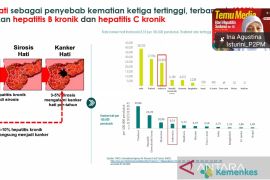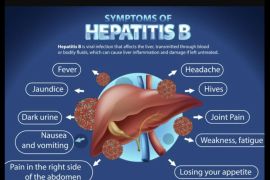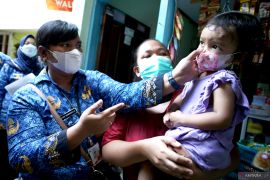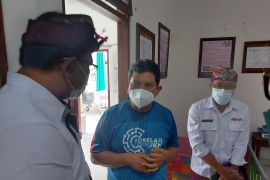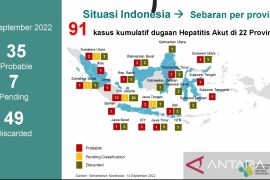The first official World Hepatitis Day themed "This is Hepatitis" is observed to increase people`s awareness and understanding about viral hepatitis which kills more than one million people every year.
Millions more suffer immediate sickness or long-term ill health due to the disease which is sometimes also dubbed "The silent killer".
Hepatitis viruses A, B, C, D and E can cause acute and chronic infection and inflammation of the liver leading to cirrhosis and liver cancer, according to WHO`s fact sheet published on its official website.
These viruses constitute a major global health risk with around 350 million people being chronically infected with hepatitis B and around 170 million people with hepatitis C.
Indonesia ranks third in the world after India and China for the number of people infected with hepatitis. The health ministry has estimated that 30 million Indonesians are infected with the hepatitis B and C viruses.
"And half of them have chronic liver disease, 10 percent of which develop liver cancer," the health ministry`s Disease Control and Environmental Health Director General (P2PL) Tjandra Yoga Adhitama said in a press conference in Jakarta on July 25, 2011.
According to him, Indonesia is country with Hepatitis B prevalence with a high endemic rate namely over eight percent, and 1.5 million Indonesians are potential to suffer liver cancer.
"We need global efforts to prevent hepatitis and provide comprehensive medical treatment," Tjandra said.
The government has carried out immunization against hepatitis B since 1977 because immunization is the most effective means to prevent hepatitis, according to Health Minister Endang Rahayu Sedyaningsih has said.
In addition to immunization, the government has also conducted other efforts to control hepatitis, such as through a healthy life style campaign, the development of National Epidemiological Surveillance Network, and donated-blood screening by the Indonesian Red Cross (PMI), Minister Endang said at a seminar themed "It`s Time to Fight Hepatitis" organized to observe the World Hepatitis Day in Jakarta on Thursday (July 28).
The success of Hepatitis control, however, very much depend on supports from all parties, including the public awareness of how to prevent the disease, the minister said.
Based on the result of Basic Health Research (Riskesdas) 2007, of 10,391 serums which were tested, the prevalence of HBsAg positive was 9.4 percent, meaning that one of 10 Indonesian people was hepatitis sufferer.
According to the health minister, more than two billion people worldwide have been infected with Hepatitis B virus and 400 million people of them have been chronic patients.
Indonesia and Brazil had initiated the launch of the World Hepatitis Day to encourage comprehensive handling of the disease comprehensively, from prevention until treatment and covering various aspects including surveillance and researches, the health minister said.
Prof. dr. Ali Sulaiman, a liver disease expert of the University of Indonesia and the Cipto Mangunkusumo Public Hospital (RSCM) said in Jakarta on Friday that the health ministry has named hepatitis as one of the priority health problems in Indonesia.
However, the public awareness of hepatitis is very poor, especially if compared with other diseases such as HIV/AIDS and malaria, he said.
Not many people know that hepatitis C is a contagious liver disease that results from infection with hepatitis C virus (HCV). It can range in severity from a mild illness lasting a few weeks to a serious, lifelong illness. HCV is usually spread when blood from a person infected with HCV enters the body of someone who is not infected.
It is estimated that 3-4 million people are infected with HCV each year. Some 130-170 million people are chronically infected with HCV and at risk of developing liver cirrhosis and/or liver cancer. More than 350 000 people die from HCV-related liver diseases each year.
Countries with high rates of chronic infection are Egypt (22%), Pakistan (4.8%) and China (3.2%). The main mode of transmission in these countries is attributed to unsafe injections using contaminated equipment.
The World Health Organization has called on nations to make combating viral hepatitis a priority as the disease kills more people than any other communicable disease in Southeast Asia.
"Viral hepatitis is a silent killer in Southeast Asia. An infected person may show no symptoms and appear healthy for years before succumbing to complications of the disease," Samlee Plianbangchang, WHO`s regional director for Southeast Asia, said in a press release recently.
Every year, an estimated 8.98 million cases of hepatitis, and 585,800 deaths occur in the Southeast Asian region. Of these, 400,000 cases and 800 deaths are due to hepatitis A, 1,380,000 cases and 300,000 deaths due to hepatitis B, 500,000 cases and 120,000 deaths due to hepatitis C and 6,500,000 cases with 160,000 deaths and 2,700 stillbirths due to hepatitis E.
The WHO urged the countries to increase infant immunization coverage for hepatitis B to 95 per cent, make testing and screening of all blood and blood products for hepatitis B and C mandatory and monitor the quality of hepatitis testing in public and private laboratories.
Viral hepatitis is a huge global health problem, according to Margaret Chan, the WHO Director-General.
"Much needs to be done to combat these infections. And much can be done. Better awareness beginning with this World Hepatitis Day is a very good start," Dr. Chan stated.
(Uu.F001/HAJM/S012)
Reporter: by Fardah
Editor: Priyambodo RH
Copyright © ANTARA 2011

